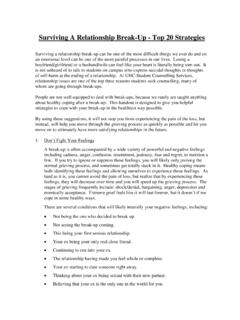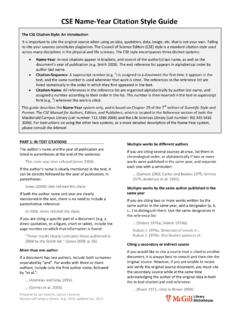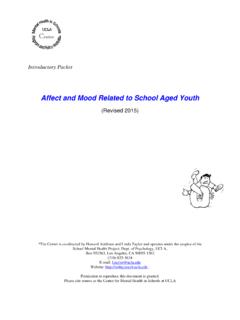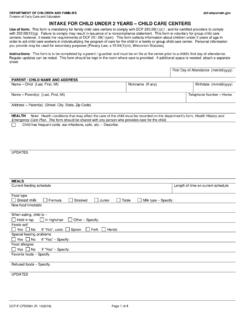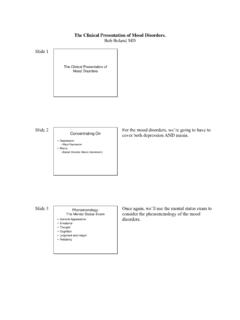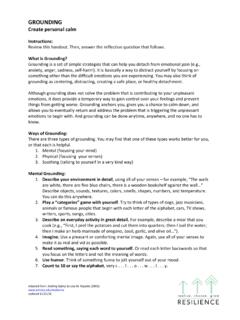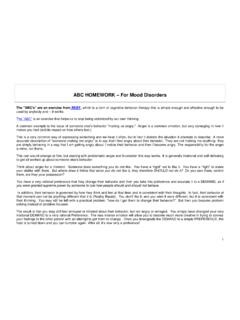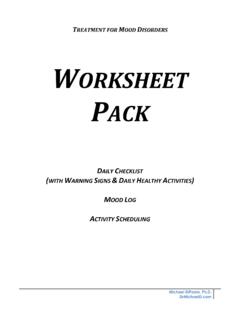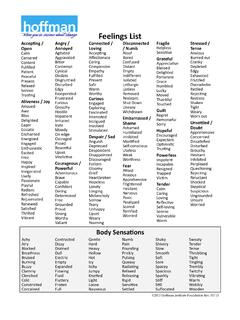Transcription of Self Help for Anxiety - McGill University
1 Self Help for Anxiety Do you find that you spend large periods of the day worrying? Do you often feel nervous, apprehensive or on edge? Do you feel that things are getting on top of you? Do you find it hard to relax and 'switch off'? Do you often experience unpleasant physical sensations such as 'butterflies' in your stomach, muscular tension, dizziness or breathlessness? If the answer to any of these questions is 'yes', you may be experiencing symptoms of Anxiety and you may find this workbook helpful. This workbook aims to help you to: Recognise whether you may be experiencing symptoms of Anxiety . Understand what Anxiety is, what causes it and what keeps it going. Find ways to understand, manage or overcome your Anxiety . Do I have symptoms of Anxiety ? If you experience symptoms of Anxiety it is likely that you will recognise many of the feelings, physical symptoms, thoughts and behaviour patterns described below.
2 Please tick the boxes which regularly apply to you. Feelings On edge Nervous Panicky Stressed Irritable/low patience threshold Uptight Physical Symptoms Tense body/Muscular pain Dizzy/Faint Chest tight or painful Stomach Churning Trembling or tingling sensations Heart racing/palpitations Breathing faster or slower than usual Concentration difficulties Thinking styles You often worry 'what if' something bad happens Your mind jumps from worry to worry You often imagine the worst case scenarios You are always on the look out for danger Behaviour Patterns Avoid doing things you would like to Pace around/Find it hard to relax Snap at people too easily Get easily flustered Talk very quickly If you have ticked a number of these boxes you may be experiencing symptoms of Anxiety . However don't be alarmed, this is very common and there are things you can do to improve your situation.
3 You will find some useful strategies in this workbook. What is Anxiety ? Anxiety is an unpleasant feeling that we all experience at times. It is a word often used to describe when we feel 'uptight', 'irritable', 'nervous', 'tense', or 'wound up'. When we are anxious we normally experience a variety of uncomfortable physical sensations. These include: Increased heart rate Muscular tension Sweating Trembling Feelings of breathlessness As well as this, Anxiety affects us mentally too. For example, when anxious, we often worry for large periods of time, so much so that our worry can feel out of control. These worries are often about a variety of issues and commonly our mind jumps quickly from one worry to another. Anxiety also influences how we behave. For instance, when we feel anxious, we often avoid doing things that we want to because we are worried about how they will turn out.
4 Although short experiences of Anxiety are part and parcel of daily life, it becomes challenging when Anxiety begins to follow people around and is a regular feature in their lives. What causes Anxiety ? Life Events: Often we develop Anxiety following a series of stressful life events. This is especially true if we experience many different pressures all at once. For example, if someone has work pressures, financial difficulties, and relationship problems, all at the same time, it is perhaps unsurprising that they become anxious. When thinking about it in this way, Anxiety is often the result of feeling as though we cannot cope with the demands placed upon us. In addition, people can learn to be anxious based on their life experiences. For example, if someone has faced workplace bullying in the past, they may be more likely to suffer Anxiety when beginning a new job.
5 Thinking Styles: Some people may have a thinking style that lends itself to experiencing Anxiety . For example, anxious people have a tendency to expect that the worst possible scenario will always occur. They also feel like they must constantly be on guard in case something bad happens. They believe that by thinking about all the things that could go wrong, they will be better prepared to cope if it happens. However thinking in these ways mean they are on regular alert and find it difficult to relax and 'switch off'. Evolutionary Reasons: We also experience Anxiety because of its evolutionary benefits. Put another way, although Anxiety is largely an unpleasant experience, it also has positive benefits that have been useful to humans over the centuries. For example, when we are under threat or feel in danger ( hear a burglar), we automatically become anxious.
6 As a result, our heart beats more quickly which supplies blood to our muscles (which helps us run away from or fight the burglar); we sweat (which cools us down during this process); and our breathing changes (which ensures oxygen is delivered to our muscles quickly, again preparing us for a quick response). When looking at Anxiety in this way, you can quickly see how it can be very useful in certain situations. Biological Reasons: It has also been suggested that Anxiety has familial ties. In other words, if someone in your immediate family is an anxious person, there is an increased chance that you will have similar personality traits. In reality it is likely that a combination of all these factors influence someone's Anxiety levels. However, in some ways it is less important to know what causes Anxiety , and more important to know what stops us overcoming it.
7 What keeps our Anxiety going? Some people have a style of thinking which lends itself to experiencing Anxiety . For example, it appears that some people are more likely to overestimate the likelihood of bad things happening than others. It is easy to see how regularly presuming the worst in this way would make someone feel anxious. Unfortunately, when we do feel anxious, we become even less likely to think as clearly as we would like and a vicious cycle occurs. Anxious people also sometimes believe that worrying has a protective function. More specifically, they believe that being on the 'look out' for danger can help them to recognise and avoid it. Unfortunately, when searching for danger in this way, they soon begin seeing potential danger in many relatively safe situations which of course makes them feel anxious.
8 They may also believe that by considering everything that could go wrong; they will be better prepared to cope when it does. However, often these beliefs mean a lot of extra time is spent worrying than is necessary, as many of our worries never come true. Of course, the more time we spend worrying, the more anxious we feel. Another way someone's thinking style can keep their Anxiety going is because they become 'worried about worrying'. Here, people tend to worry that they are doing harm to themselves ( going mad) by worrying so often (which is not the case) and a vicious cycle occurs. Similarly, people often worry about the physical symptoms they experience when they are anxious ( breathlessness, rapid heart rate etc). Unfortunately, worrying about these symptoms (which are perfectly safe and natural bodily reactions), only makes them feel worse, again creating a vicious cycle of Anxiety .
9 One other important factor that can keep people's Anxiety going is that they often change their behaviour as a result of their Anxiety . For example, they may avoid going to a party because they have spotted many potential 'dangers' ( what if no one likes me ). Similarly, they may put off completing an assignment because they worry about it being negatively evaluated. Unfortunately because people tend to use such avoidance strategies, they can never see that things would often go better than they thought and their Anxiety remains as a result. Not having enough free time to relax and do the things we enjoy we can also contribute to our higher Anxiety levels. On the other hand, having too much free time can mean we have lots of opportunities to engage in worry and feel anxious. When looking more closely at Anxiety , you can begin to see that our thoughts, feelings, behaviours and physical symptoms all interact and combine to keep our Anxiety going.
10 See the diagram overleaf. How can I reduce my Anxiety ? Fortunately, there are a number of strategies that we can use to reduce our Anxiety . These include: 1. Understanding more about Anxiety . 2. Learning how to challenge your unhelpful thoughts and see things in a more realistic light. 3. Improving your problem solving skills. 4. Learning how to reduce the amount of time you spend worrying. 5. Learning how you can feel more relaxed (physically and mentally). 6. Learning how to stop avoiding the things that make you anxious. When going through this booklet it can sometimes be more helpful to try out the ideas above one at a time, rather and trying to learn them all at once. However simply take things at your own pace. Understanding Anxiety Anxiety is undoubtedly an unpleasant feeling, but it is something that everyone experiences.
